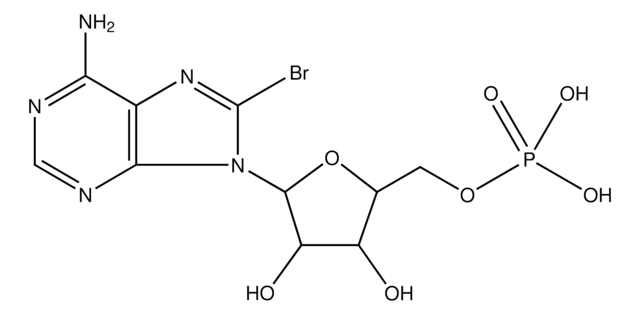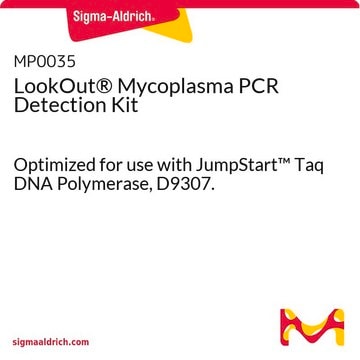B5416
8-Bromo-cyclic adenosine diphosphate ribose
85% (HPLC), lyophilized powder
Synonym(s):
Br-cADP-ribose, Br-cADPR
About This Item
Recommended Products
Quality Level
Assay
85% (HPLC)
form
lyophilized powder
color
white
solubility
H2O: 5 mg/mL
storage temp.
−20°C
SMILES string
Nc1ncnc2n([C@@H]3O[C@@H]4COP(O)(=O)OP(=O)(O[C@@H]5O[C@H](CO)[C@@H](O)[C@H]5O)O[C@H]4[C@H]3O)c(Br)nc12
InChI
1S/C15H20BrN5O13P2/c16-15-20-6-11(17)18-3-19-12(6)21(15)13-9(25)10-5(30-13)2-29-35(26,27)34-36(28,32-10)33-14-8(24)7(23)4(1-22)31-14/h3-5,7-10,13-14,22-25H,1-2H2,(H,26,27)(H2,17,18,19)/t4-,5-,7-,8-,9-,10-,13-,14+,36?/m1/s1
InChI key
PLQQKRPSINJWTK-VNMBDIRDSA-N
Biochem/physiol Actions
Physical form
Preparation Note
Signal Word
Warning
Hazard Statements
Precautionary Statements
Hazard Classifications
Eye Irrit. 2 - Skin Irrit. 2 - STOT SE 3
Target Organs
Respiratory system
Storage Class Code
11 - Combustible Solids
WGK
WGK 3
Flash Point(F)
Not applicable
Flash Point(C)
Not applicable
Personal Protective Equipment
Certificates of Analysis (COA)
Search for Certificates of Analysis (COA) by entering the products Lot/Batch Number. Lot and Batch Numbers can be found on a product’s label following the words ‘Lot’ or ‘Batch’.
Already Own This Product?
Find documentation for the products that you have recently purchased in the Document Library.
Our team of scientists has experience in all areas of research including Life Science, Material Science, Chemical Synthesis, Chromatography, Analytical and many others.
Contact Technical Service







